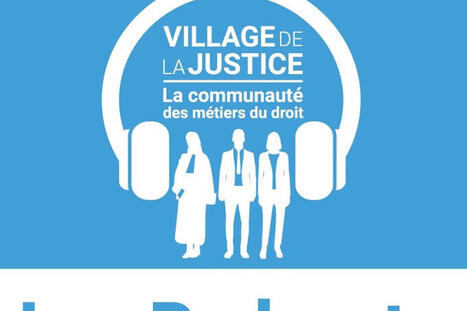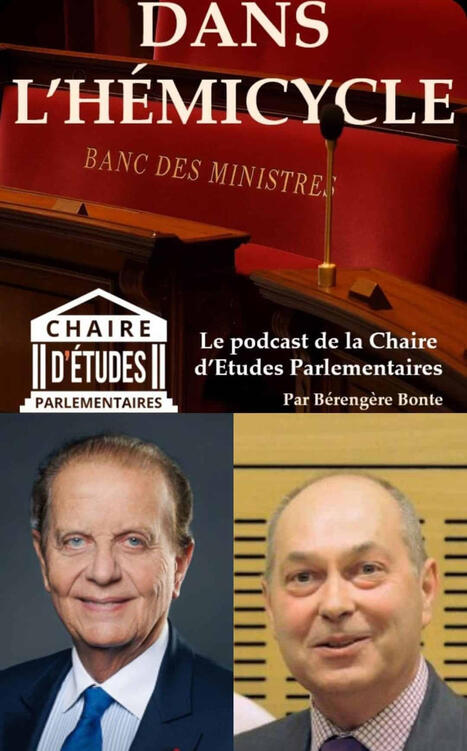 Your new post is loading...

|
Scooped by
Stéphane Cottin
July 10, 2025 1:10 PM
|
Recherche documentaire juridique : méthodologie - Édition 2025-2026 de Stéphane Cottin, Vincent De Briant, Audrey Zians, sur la librairie juridique Lgdj.fr

|
Scooped by
Stéphane Cottin
January 8, 2:22 AM
|
This paper critically addresses the application of the Better Regulation principles within the European Union’s evolving legislative framework for the digital e

|
Scooped by
Stéphane Cottin
December 21, 2025 3:25 PM
|
Le podcasting ou comme le disent nos amis Québécois la balladodiffusion est une technique de diffusion d’un contenu sur Internet qui a émergé en 2004 grâce à l’avènement du web 2.0 [1]. Principalement utilisée par les médias, cette technique de diffusion d’information se généralise au point de devenir un véritable outil de communication facilement (...)

|
Scooped by
Stéphane Cottin
December 15, 2025 10:28 AM
|
This paper explores the integration of Artificial Intelligence (AI) in mergers and acquisitions (M&A) due diligence, examining the transformative effect on

|
Scooped by
Stéphane Cottin
December 14, 2025 3:36 PM
|

|
Scooped by
Stéphane Cottin
December 12, 2025 7:46 AM
|
Copyright © 2025 for the individual papers by the papers' authors. Copyright © 2025 for the volume as a collection by its editors. This volume and its papers are published under the Creative Commons License Attribution 4.0 International (CC BY 4.0).

|
Scooped by
Stéphane Cottin
December 11, 2025 2:10 AM
|
In the past few years, large language models (LLMs) have achieved significant technical advances, such that legal-advocacy organizations are increasingly ado

|
Scooped by
Stéphane Cottin
December 10, 2025 6:09 AM
|
Teaching constitutional law today has been impacted by two trends reflecting a polarized electorate and politics: first, recent restrictions targeting education

|
Scooped by
Stéphane Cottin
December 7, 2025 1:58 PM
|

|
Scooped by
Stéphane Cottin
December 2, 2025 1:40 AM
|
Guide d'accès aux rapports, lois, règlements, statistiques des institutions officielles françaises

|
Scooped by
Stéphane Cottin
December 2, 2025 1:39 AM
|
Guide d'accès aux rapports, lois, règlements, statistiques des institutions officielles françaises

|
Scooped by
Stéphane Cottin
November 20, 2025 3:27 AM
|
In many jurisdictions, academia is at the service of legal practice. Law professors write commentaries that summarize the state of the art of doctrine, chiefly

|
Scooped by
Stéphane Cottin
November 18, 2025 2:47 AM
|
The alacritous incorporation of Artificial Intelligence (AI) into judicial systems worldwide has triggered both optimism and unease. From predictive an
|

|
Scooped by
Stéphane Cottin
January 9, 2:12 AM
|
Publisher: Vilnius University Institute of Data Science and Digital Technologies, Journal: Informatica, Title: Ontology-Based Knowledge Graph Approach for Legal Queries, Authors: Vuong T. Pham, Dang V. Dung, Hung Q. Ngo, Binh Nguyen, Nhon V. Do, Ali Selamat, Hien D. Nguyen , Abstract: In the legal domain, ontologies organize legal concepts and their relationships, while knowledge graphs connect these concepts to specific entities in legal documents. This study proposes a solution for integrating ontology and knowledge graph, called Legal-Onto model, to construct a knowledge base of an intelligent retrieval system in the legal domain. The Legal-Onto model combines ontology as the conceptual layer and knowledge graphs as the implementation layer for representing the content of legal documents. This relational model is integrated with a structure of knowledge graph to identify relations between concepts and entities extracted from ontology in the determined domain. Moreover, this research addresses inherent challenges in semantic-based knowledge-driven search. The specific objective is to accurately extract relevant information from legal documents to respond to entered queries. The experimental results show that this method is more effective than state-of-the-art methods in natural language processing and large language models, which are without specific legal domain knowledge.

|
Scooped by
Stéphane Cottin
December 22, 2025 12:43 PM
|
Première décision de justice rendue en France dans une affaire impliquant des hallucinations de l’IA : le chercheur en droit Damien Charlotin analyse en avant-première ce cas inédit. Il rappelle une distinction essentielle pour les professionnels du droit : toutes les IA ne se valent pas.

|
Scooped by
Stéphane Cottin
December 19, 2025 3:11 AM
|
The rapid advance in the abilities and ubiquity of Large Language Model (LLM) artificial intelligence platforms has given rise to countless applications

|
Scooped by
Stéphane Cottin
December 15, 2025 1:18 AM
|
Polysemous legal vocabulary is both highly frequent and conceptually central in Legal English, yet its instructional treatment remains insufficiently developed.

|
Scooped by
Stéphane Cottin
December 14, 2025 11:57 AM
|
Episode 2 : « Justice et politique : l'impossible entente ». Invités : Dominique Perben (ancien garde des Sceaux et député, avocat) et Georges Bergougnous (ex-Directeur des affaires juridiques de l’Assemblée, ex-chef du service des affaires juridiques du Conseil constitutionnel, ex-membre du CSM et prof de Droit constitutionnel)

|
Scooped by
Stéphane Cottin
December 11, 2025 2:11 AM
|
“Bots” powered by artificial intelligence systems are enormously powerful and versatile. Trained bots can take on a wide variety of roles, speaking and actin

|
Scooped by
Stéphane Cottin
December 11, 2025 1:09 AM
|
This paper examines how the adoption of artificial intelligence (AI) technologies influences judicial performance in China. We use large language models to iden

|
Scooped by
Stéphane Cottin
December 7, 2025 2:43 PM
|

|
Scooped by
Stéphane Cottin
December 2, 2025 1:41 AM
|
Guide d'accès aux rapports, lois, règlements, statistiques des institutions officielles françaises

|
Scooped by
Stéphane Cottin
December 2, 2025 1:40 AM
|
Guide d'accès aux rapports, lois, règlements, statistiques des institutions officielles françaises

|
Scooped by
Stéphane Cottin
December 2, 2025 1:25 AM
|
This paper explores advancements in Natural Language Processing (NLP) for legal lay summarization by systematically analyzing existing methodologies, datasets, and research findings. We review current literature, highlighting key challenges such as data scarcity and the complexity of legal language. A primary contribution of this study is the development of LegalEase, a specialized dataset designed to improve model training for summarizing legal documents in layman’s terms. Our findings demonstrate that subdomain-specific datasets within the legal domain outperform general legal datasets in enhancing NLP model performance for generating accurate and comprehensible legal summaries. The insights and methodologies presented provide a foundation for future research in legal lay summarization.

|
Scooped by
Stéphane Cottin
November 19, 2025 2:46 AM
|
Synthetic data is increasingly important in data usage and AI design, creating novel legal and policy dilemmas. All too often, discussions of synthetic data tre

|
Scooped by
Stéphane Cottin
November 11, 2025 11:57 PM
|
Recently different regulations and recommendations for the use of AI-based technology, especially in the judiciary, have become more prevalent. One major concer
|
 Your new post is loading...
Your new post is loading...




















